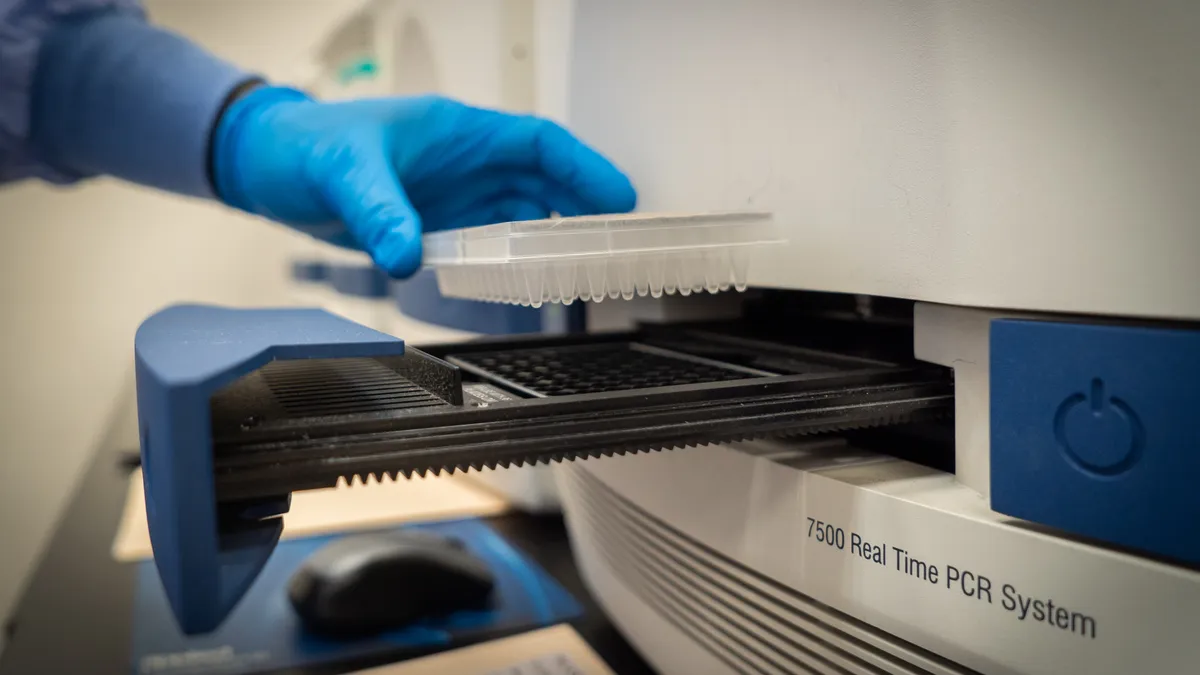Dive Brief:
- A trade group representing laboratories including LabCorp and Quest on Friday asked the Biden administration to support legislation to establish a new framework for regulating clinical laboratory diagnostics, including lab developed tests.
- The request, from the American Clinical Laboratory Association, comes after U.S. Sen. Rand Paul (R-Ky.) last week reintroduced a bill that would place authority over all aspects of laboratory developed testing procedures with HHS rather than FDA. ACLA did not endorse specific legislation.
- In a letter to HHS Secretary Xavier Becerra, ACLA argued that laboratories are already subject to extensive regulation under the Clinical Laboratory Improvement Amendments of 1988 as well as state laws and urged HHS to avoid implementing "inappropriate and counterproductive regulation of LDTs as medical devices."
Dive Insight:
The COVID-19 pandemic rekindled a long-running debate over whether FDA should regulate lab developed tests, which are designed, manufactured and performed within a single laboratory. HHS caught the industry off guard last summer when it announced that FDA would allow LDTs, including COVID-19 tests, to be distributed without first undergoing a premarket review.
The policy shift under the Trump administration drew widespread criticism, including from Scott Gottlieb, who served as FDA commissioner under the former president. FDA oversight of LDTs is an established policy reinforced by numerous guidance documents, Gottlieb said at the time. The agency has long held that the tests are devices under its authority granted by the Medical Devices Amendments of 1976.
In its letter to HHS, ACLA said the unexpected policy change by HHS in August created confusion and was disruptive for labs working around the clock to develop and perform COVID-19 tests in the emergency response to the pandemic. But ACLA reiterated its position that FDA does not have statutory authority to regulate LDTs as medical devices under the Federal Food, Drug and Cosmetic Act.
The group urged the Biden administration to consider the input and expertise of the laboratory community before potentially resetting regulatory expectations again, which it said could hurt efforts to provide accurate and reliable COVID-19 tests and undermine the role of LDTs in other areas such as precision medicine.
ACLA said it is looking to work with HHS to advance legislation specifically for the oversight of diagnostics. A new regulatory system for diagnostic tests should avoid application of the current medical devices framework, address differences between In vitro diagnostics and LDTs, and acknowledge that laboratories are already subject to extensive regulation under CLIA and state law, the group said.
"For several years, ACLA has been actively engaging with Congress, FDA and the stakeholder community to develop and improve legislative proposals for a new statutory framework for diagnostic regulation, including the VALID Act," states the group's letter to HHS.
Prior to the HHS policy change in August, Congress had been working on the regulation of LDTs. The Verifying Accurate, Leading-edge IVCT Development (VALID) Act introduced in March 2020 in both the House and Senate creates a new test product category — in vitro clinical tests, which includes lab developed tests — while giving FDA authority to review and approve IVCTs.
ACLA argues that the level of regulatory oversight should reflect the risk that a test may present, and the legislation should include transition and grandfathering provisions for existing diagnostic tests. The legislation also should require FDA to incorporate notices and comments when implementing the new system.
"With your support, we believe that a legislative solution will lead to regulatory certainty and help laboratories continue to meet the needs of our healthcare system before, during and after public health emergencies," the group stated.
In reintroducing the Verified Innovative Testing in American Laboratories (VITAL) Act, Paul said his bill aims to remove unnecessary barriers that have "drastically slowed" the response to the pandemic. "When we face a health emergency, government should trust academic, community and public health labs to do what they are already trained and certified to do," said Paul.
The bill is supported by the Association for Molecular Pathology and the Association of Pathology Chairs.











